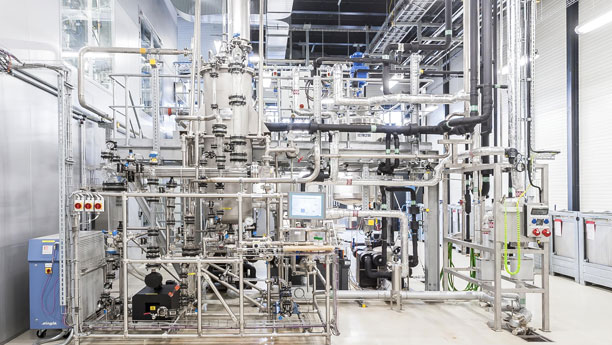Green chemistry from wood and oil
Bioplastics may be biobased, but they are not necessarily environmentally friendly. In addition, the basic chemical building blocks for bioplastic production are still mostly produced from the starchy fruits of agricultural crops.

To avoid competition with food production, the EU research consortium "Bioconsept" was launched four years ago. Bioconsept is 13 million euro EU-funded research project, which converts second-generation biomass into valuable platform chemicals and bioplastics. It has developed manufacturing processes for two platform chemicals, which are derived from inedible biomass – such as wood or old vegetable oil. Twenty-nine European partners from industry, science, research and technology organisations, as well as small and medium sized enterprises have collaborated to implement these processes on an industry relevant scale. A balance was drawn up at a meeting in the Ständehaus in Merseburg on 10 and 11 November.
The four-year EU-funded BioConSepT research project has developed production processes based on non-edible biomass. In comparison to current processes for bioplastic production, they do not compete with food production and processes aim to be cheaper and more sustainable. The second-generation biomass used includes non-edible oils and fats, as well as lignocellulose (wood and straw). They are transformed into intermediates like biobased polymers, resins, plasticisers and solvents, which can be applied in bioplastic production.
Progress from biomass to applications
The whole production chain, from feedstock to final applications, is reflected in this European collaborative project. Chemical, enzymatical and microbial processes convert second-generation biomass, which cannot be used in food production, into valuable platform chemicals used for example in bioplastics. Robust enzymes and microorganisms, continuous processes, new bioreactors and selective purification technologies were important factors to reduce production cost.
Large-scale production
Upscaling of processes closes the gap from the lab to industrial production. The successful demonstration of production of furandicarboxylic acid (FDCA) and epoxides in product-relevant amounts shows the potential of second-generation biomass. Bioreactors with up to 1m3 produce about 100kg of both platform chemicals. They can be applied in packaging, in textiles as high strength fibres or in coatings and adhesives.
Final conference in Merseburg, Germany
The consortium invited the international chemical industry to Merseburg, Germany, from 10th – 11th November to showcase BioConSepT results. The conference focused on the upscaling of production of FDCA and enzymatic epoxidation to an industrially relevant scale. It included a visit to the piloting facilities of Fraunhofer CBP in Leuna, where some of the processing steps have been conducted. The consortium also presented the project’s most promising results from other bio-based chemical production chains.The EU consortium has tested the production of platform chemicals from biomass at pilot plants like this one at the Fraunhofer Research CBP in Leuna.


